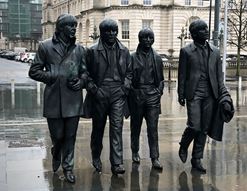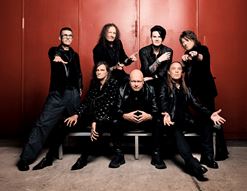Do you like Led Zeppelin? The Beatles?
If you do - and of course you do - then you’ll have been listening to music tinged with the occult and the magical. Some of the world’s best-loved musicians have involved themselves with occult practices, to one degree or another over the years.
We notice it strongly on the more heavy genres because those artists tend to use more overt imagery, but it goes wider and deeper than that.This is not just the domain of extreme metal artists (though they definitely factor in), but rock musicians across the spectrum.
What do these people find in such practices? What even are the practices? Why does Aleister Crowley’s name keep creeping up?
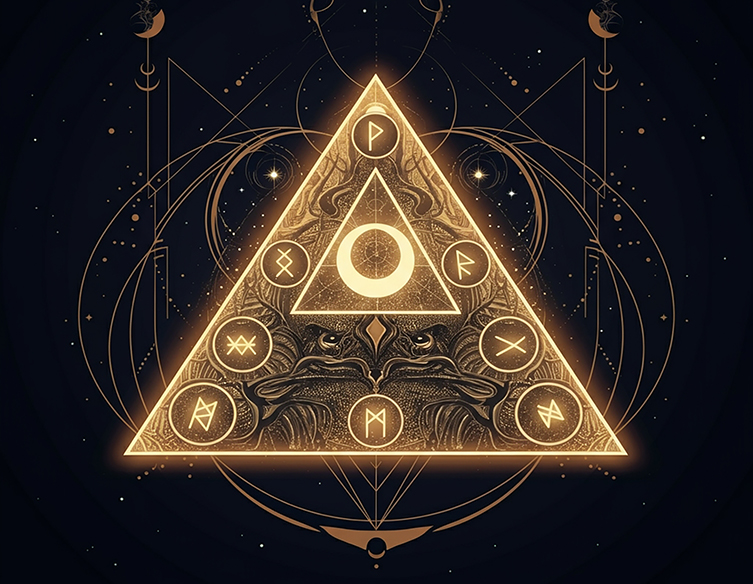
Contents
“Do What Thou Wilt Shall Be the Whole of the Law”
Jimmy Page, Zoso and Boleskine House
Black Sabbath & The Dark Figure in the Room
Killing Joke, Crowley and Giza Pyramid Rituals
The Devil and Scarborough Fair
The Wicker Man - British Folklore
I’ll step into this world like an intrepid adventurer, calling upon experts, associated acts and people I’ve spoken with in the past. It’s a deep, labyrinthine subject and I don’t hope to cover it all here. What I do hope to do is pique your interest, and offer up some interesting rabbit holes for you to travel down, should you see fit.
I’ve reached out to a number of people on different subjects, including Nergal from Behemoth and Tim Templar from Green Lung. Their insights illustrate how magickal thinking permeates music to this very day. Experts and enthusiasts will have already recognised much of what follows in today’s blog (and indeed will have taken such subjects far further than I have the space for), but for those of you who’ve ever wondered about the compelling influence of ‘esoterica’ in their favourite music, then today’s blog should hopefully illuminate certain future pathways for you.
Let’s begin with the name that seems to tie a lot of these strands together: Aleister Crowley…
Aleister Crowley
I bet you’ve heard the name ‘Aleister Crowley’ before, haven’t you? Even though Crowley was from another age (he was born in 1875 and his name rhymes with ‘show’ rather than ‘cow’), the infamous magickal practitioner keeps popping up in music/popular culture. Here’s a few quick examples of this…
- He’s on the cover of The Beatles’ Sgt Pepper’s album cover (Google this for all kinds of fan theories)
- Killing Joke’s Jaz Coleman is currently putting Crowley’s works to symphonic music
- Ozzy Osbourne’s (mispronounced) Mr Crowley is a direct reference to him.
- David Bowie mentioned him in Quicksand from the Hunky Dory album.
- Led Zeppelin maestro Jimmy Page was fascinated by him (more later)
- Ghost’s Impera album cover art is based on a famous photograph of Crowley.
- Behemoth’s frontman Nergal has that same photo tattooed on his arm (see below)
- Crowley appears in loads of comics, from numerous Alan Moore books (From Hell, V For Vendetta and particularly Promethea) to Sandman and even Spider-Man.
- Filmmaker Kenneth Anger featured/referred to Crowley throughout his career.
- Current 93 have a song called Crowleymass, which contains some sampled speech of Crowley.
But who was he? And why was/is he such an influential figure? Well, those are actually complicated questions, because he was a lot of things. Everyone’s got an opinion of the guy and his various deeds, so depending on what you read, he’s a combination of the following:
- Magician
- Poet & novelist
- Pioneering Mountaineer
- Establisher of Thelema, a religion (or at least a religious philosophy)
- Painter
- Travel writer/journalist
- Personal Development guru
- Self-proclaimed prophet
- British spy
- Raconteur
- Libertine
- Drug addict
- Con man
- Sensational self-promoter
- Entertaining charlatan
- Wickest Man in the World (called such by writer Horatio Bottomley, but reportedly referred to as this also by his own mother!!)
Crowley was the son of a wealthy family of brewers and lay preachers, who attended the best private schools and moved in elite circles. He was a member of several magickal orders and groups (the Hermetic Order of the Golden Dawn is the famous one), and took part in a large number of rituals and evocations across the world. His philandering and deliberately outrageous behaviour caused endless scandals in Victorian culture, particularly since many of the more fantastical stories seem to be supported by evidence.
He was a subversive character, to say the least, and no single blog can really sum up his complications and contradictions, so I’d recommend delving into books such as Perdurabo by Richard Kaczynski for a more balanced take on the man which doesn’t play too far into sensation, stereotype or hearsay.
That said, there is an awful lot written about Crowley (not least by himself), so have fun tumbling down the rabbit hole if you see fit! He’s the most famous and controversial practitioner of ‘magick’ in modern history (the added ‘k’ is used to differentiate ritualistic practices from things like card tricks and David Copperfield’s illusions) and is both directly and indirectly responsible for some quite amazing tales of intrigue, triumph over adversity, terrible behaviour and extreme examples of witchcraft.
“Do What Thou Wilt Shall Be the Whole of the Law”
The above statement (also found on Jay-Z merch, interestingly) is the one most often bandied around by enthusiasts to somehow explain Crowley’s entire philosophy, alongside “Love is the Law, Love Under Will”, both of which are often seemingly taken out of context. Not that I’m any sort of expert on (or indeed defender of) ‘Old Crow’, but the first quote reputedly supports the notion of a person’s individual sovereign will being a significant guiding principle in one’s life. The second quote is about how willpower and self-determination are as important in life as love itself.
The man made for some good copy, that’s for certain. Try this sampling:
- “Intolerance is evidence of impotence”
- “Belief is the enemy of knowledge”
- “Every man and every woman is a star”
- “Falsehood is invariably the child of fear in one form or another”
There are more. He was many things, and one of those things was a very shrewd self-publicist. Something tells me he’d do very well in today’s social media-obsessed culture, but then perhaps he’d never get away with half of his escapades if there were as many cameras around then as there are now!
Crowley is ranked as one of the 100 most influential individuals of the UK. I’m going to bet that you’ve heard of him, and I’m also going to (less confidently) bet that you haven’t read his novels or poetry in any great detail. Coleman himself states "Few have influenced the post-war bubble of counterculture quite like Crowley", which I wouldn’t dispute.
So, given that his actual works were pretty ‘niche’ to put it mildly, what is the enduring appeal of this controversial character? Was it that he was a disruptor, challenging moral and social etiquette of his time? Was it that he understood the power of presentation and suggestion? Was it that he was a kind of proto-rock star, decades before such a thing existed?
Nergal
Nergal from Polish Blackened Death metal band Behemoth is another prominent artist attracted to Crowley’s subversive ways. I spoke to Nergal back in 2020 and he considered Crowley through today’s lens:
Nergal: “I think he was hugely ahead of his time. I’m not the person who would go ‘what if’... but...if we take the scenario ‘if’ Aleister Crowley was born today, no one would give a fuck. (laughs) Because it is so difficult to stand out, to make a statement and be heard. And to just create something that’s eventually gonna become a footprint for other people, you know what I mean? Like, ideologically, or philosophically or whatever. It’s so difficult; these times are so chaotic, but I’d say the same for Jesus. If there was a historical Jesus who made all of that impact, would he make that impact today? I seriously doubt it! They’d just fucking put him into a mental asylum, you know what I mean?
Me: He’d be a case study for someone.
Nergal: Yeah, as a case study. Or, he’d just be completely ignored! Or, would he use Instagram? Or Facebook? Or would he be one of the terrorists, you know? For one of the terrorist groups, You know what I mean? It’s like, times are changing now, so, like, for some of the guys who made such a massive impact, I think they were born in the right times. And I bet that Crowley, with all his ideas, was a game-changer, and he was very much needed for his times, and that’s why he’s one of the most inspiring figures - certainly one of the most controversial figures - in the modern age.
Me: This culture.
Nergal: Yeah, this culture. And beyond, I’d say. On many levels.”
The enigma continues, through one of history’s biggest rock bands…
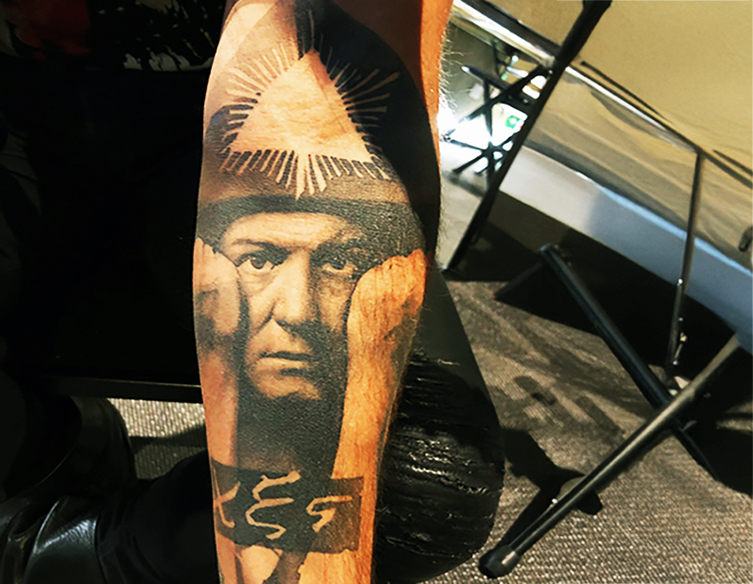
Nergal's tattoo of Crowley. (Photo: Ray McClelland)
Jimmy Page, Zoso and Boleskine House
One of Crowley’s most famous fans is also one of rock music’s most cherished guitar icons. A self-appointed ‘student of Crowley’s philosophies’ (such as Thelema, see the video earlier), Led Zeppelin’s Jimmy Page owned an occult bookshop in 70s London (called Equinox, no longer there sadly) and was apparently fascinated by Crowley long before he found fame in music, reading Crowley’s Magick in Theory and Practise at the impressionable age of 11.
When he did find fame though - and the money that came with it - he sought out and bought Boleskine House, a lodge up on the banks of Loch Ness in the Scottish Highlands once owned by Crowley.
Crowley bought the place in 1899, intending to use the isolated location as a platform to perform a complex ritual, found in ‘The Book of Secret Magic of Ambramelin the Mage’. Crowley himself confessed in his autobiography that he never finished the ritual, and claimed that he’d therefore unleashed dangerous forces.
Alongside this, there were local stories of strange noises, bizarre behaviour and even an attempted murder occurred at Boleskine under Crowley’s ownership, some of such events being reported by Crowley himself.
Page bought the place in 1970 and said “The thing about Boleskine House is that it was the home of Aleister Crowley, a person who I’ve been interested in. The house is quite a long way from the road, and the thing about the house that was interesting was that Crowley had actually built a temple there.”
Page was not immune to supernatural experiences, as he reported to Rolling Stone magazine in 1975: “There were definitely presences there… the bad vibes were already there. A man was beheaded there, and sometimes you can hear his head rolling down.”
Page sold Boleskine House in 1992. Since then, a number of mysterious fires have plagued the building. Current owners are redeveloping the property, but locals tend to steer clear of it.
As for Page’s famous ‘Zoso’ logo, Page has actually been somewhat reluctant to say too much on the matter. It seems to relate to elements of the zodiac, with part of the sigil relating to Saturn, a planet that often has somewhat sinister connotations within occult circles.
Some other esoteric sleuths reckon the symbol relates to the Red Dragon, which is presumably the same Red Dragon from the biblical book of Revelation, and famously painted by English visionary William Blake.
Black Sabbath & The Dark Figure in the Room
Ozzy, Tony & co have obviously made a career out of referencing the occult, but is it mere marketing and windowdressing, or is there some substance to Black Sabbath’s famously doomy aesthetic?
Well, if the following tale is true - and who am I to say otherwise? - then I’d say the band were certainly adjacent to some powerful forces at least. The tale goes like this…
Bassist Geezer Butler was retiring to bed for the night and had decided to read a page or two from an old 16th century occult book lent to him by Osbourne. As part of the post-hippie generation, Butler was fascinated by (though apparently not into practising) spiritualism and black magic. This was when the band was still called Earth. Anyway, Butler put the book on a shelf and went to sleep. I’ll let Geezer say the next part:
“That night, I woke up suddenly and there was this black shape at the bottom of my bed. It just vanished into thin air as I was staring at it. I thought it had to have something to do with this book that Ozzy brought around for me. I leapt out of bed, rushed to the cupboard to throw the book out, and the book was gone.”
When Butler told Ozzy the story, he quickly formed it into the lyrics for signature song Black Sabbath, which the band also re-christened themselves after the event. That one moment set the tone for the Black Sabbath’s entire career, one which will be drawn to a magnificent close this Summer with their ‘Back to the Beginning' extravaganza at Villa Park in Birmingham.
Killing Joke, Crowley and Giza Pyramid Rituals
Killing Joke’s entire career contains references to occult practices, with all four members being influenced by esoteric schools of thought to one degree or another. For example, vocalist Jaz Coleman (who doubles as a classical composer and was honoured with the title French Chevalier des Artes at des Lettres) has used Rosicrucian texts and teachings to plot out his life’s works. This is all detailed in his book Letters From Cythera, a philosophical memoir that he released back in 2013.
Indeed, the catalyst to write this very article today was the announcement of Coleman’s forthcoming choral/orchestral work based on Aleister Crowley’s Liber Al vel Legis, otherwise known as his Book of the Law.
But the most eerie - and characteristically unorthodox - example of Killing Joke’s dedication to esoteric principles occurred in the early 90s, when the band were recording their Pandemonium album…
Back in 1993, Coleman and the rest of Killing Joke arranged for a few days’ recording in Cairo, in order to use local Egyptian classical musicians to augment their sound. Now, the full story about all of this is pretty amazing, so do google it from somewhere like Louder Sound (or check out the feature length KJ documentary The Death and Resurrection Show), but here are the main beats:
Jaz Coleman: “I had recorded in Egypt before, so I was telling Youth how great the studio was, and he said: “We don’t wanna play in the studio. We wanna play in the Great Pyramid, man.” I thought he was completely potty. I’d been working in Egypt for years and I knew how difficult it was to organise anything like that. I couldn’t see that it would be even remotely possible.”
Nevertheless, officials were sought out, palms were greased with cash, and the Great Pyramid at Giza was made available to the band for three days. Bassist Youth (also super-producer for U2, Pink Floyd, The Verve etc) was interested in the angles of the pyramid’s outer walls, and its location atop the sacred St Michael ley line.
Crowley pops up yet again, with Coleman remarking “Aleister Crowley had The Book Of The Law dictated to him in there, and when you get into the King’s Chamber it is just awesome to contemplate who and what has been in there.”
The plan was to record vocals for several tracks inside the King’s Chamber section of the pyramid, but the band and their crew ran into problems, not least the fact that their industrial batteries - 10 hours’ worth of power - were somehow being drained by the pyramid in less than 15 minutes. The sessions were not producing anything usable, and a bad vibe descended on the band.
Youth realised after meditating that a more ceremonial approach was required, paying close attention to numerology in terms of numbers of people allowed inside the chamber at any time. He fully immersed himself in the role of ceremonial practitioner in order to more sensitively work alongside the hidden energies inside the pyramid: “I was conducting the ceremony virtually naked with just a very thin lungi round my waist, and I was running about with these burning sage bushes in my hand. I had brought in lots of flowers, garlands, incense, some holy water, and these naturally wand-shaped quartz crystals. They can cut through negative psychic binds. I used them in casting the circle, and I think it made a big difference.”
One assistant fell asleep in the chamber and then awoke screaming and ran away; a number of women who’d been waiting to record suddenly appeared in ceremonial dress and began to sing; Jaz became a vessel for the energies they were all feeling in the chamber. As Youth said: “The ceremony worked. We set up the space, and that let it come through. You kind of tap into it, and it came through in Jaz’s performance”.
The engineer who ran out, Sameh Almazny, continues to be haunted by the experience: “It’s like a nightmare. These eyes, shiny eyes, come to my dreams many times. From this day, I never go to the pyramids.”
After securing their desired takes, the band left the pyramid, only to be met with a full-on Bedouin celebration outside, complete with rapturous dancing and fire. The audio takes recorded inside the pyramid actually made it onto the finished Pandemonium record, and for those interested, the exact songs are Millennium, Pandemonium and Exorcism.
The Devil and Scarborough Fair
Simon & Garfunkel are not exactly who I think of when the word ‘Satan’ is mentioned, but here’s some good trivia for you.
No, the pair aren’t secret Satanists, sorry! But their famous cover version of Scarborough Fair (taught to Paul Simon by folk artist Martin Carthy) brought the song to the masses, and there’s an interesting thread running through the tune…
This old English folk ballad talks of a man propositioning a woman, who responds with hesitant consent to being his lover, but only if he’s able to complete certain tasks that are detailed in each verse of the song. Look more closely at the lyrics, because these are the tasks she sets out:
- To make a shirt with no seams or needlework
- To find an acre of land between salt water and the sea
- To reap a field with a leather sickle
If the man is able to complete these tasks, then “he’ll be a true love of mine”. Here’s the kicker though: each of those tasks is quite obviously impossible to complete, implying that the woman has no intention of ever becoming a lover to this mysterious man. Some accounts talk about the male character being an ‘elf’ but most references concede to him being satan himself, and the female object of his affections is using his own famously wiley ways against him in order to escape his diabolic grasp.
Not just a twee folk song after all!
Coil
The worlds of occultism, ritual, alchemy, Crowley, John Dee (well worth another rabbit hole of investigation), Hermeticism and more all converged in the darkly intense world of Coil. Coil’s industrial/ambient soundscapes were as innovative as they were influential, particularly within avant-garde and electronic scenes. Here’s Trent Reznor’s praise for Coil:
“I was always more attracted to Coil than Throbbing Gristle; the darkness and the scatology really chimed with me. If it's not immediately obvious: Horse Rotorvator was deeply influential on me. What they did to your senses. What they could do with sound. What Jhonn was doing lyrically. The exotic darkness of them permeated their work.”
Coil were primarily two people - John (sometimes written as Jhonn) Balance and Peter ‘Sleazy’ Christopherson - who had both previously been involved with proto-industrial mavericks Throbbing Gristle and their offshoot band Psychic TV.
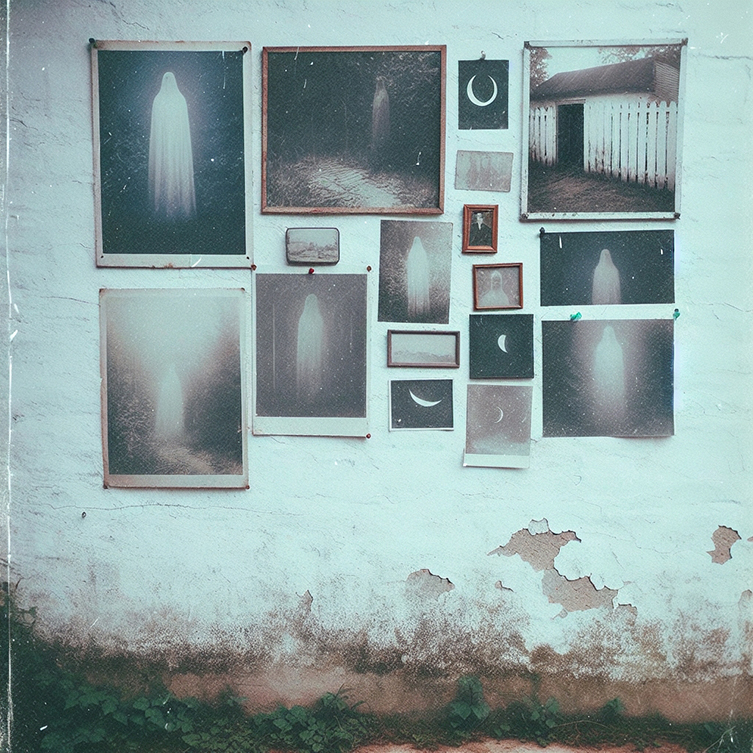
Coil developed their own magickal sound based on sampling, found sounds and occult disciplines. Chaos magic seems to be at the heart of most of their ethereal music, which is suitable given how piecemeal and opportunistic their sound gathering could be. Chaos Magic’s central tenets revolve around rejecting strict dogmas in favour of whatever seems to work for the individual, as Christopherson himself once imparted: “We don't follow any particular religious dogma. In fact, quite the reverse, we tend to discourage the following of dogmas, or false prophets, as it were. And we don't have a very sympathetic view of Christians up to this point. The thing we follow is our own noses; I don't mean in a chemical sense”. That to me is a good description of how Balance and Christopherson approached their sonic canvases too.
Coil were well known in the underground, and also became revered remixers for bands like Nine Inch Nails, Autechre and other artists. Sadly, both members died relatively young. Balance - who battled alcoholism throughout his life - died falling from a balcony at the age of 42. His partner Christopherson died in his sleep six years later, at the age of 55. Their music of course lives on in all of its darkly ambient beauty.
The Wicker Man - British Folklore
One touchstone for many occult devotees is the 1973 cult horror movie The Wicker Man. The film’s dedication to portraying some pretty accurate British folkloric traditions has made it a constantly-referenced source for enthusiasts.
This folkloric influence can be seen through generations of art, from books (Robert Holdstock’s Mythago Wood), to movies (Midsommar) and very much in music. The Wicker Man’s soundtrack has proven immensely influential to folk, rock and metal artists, thanks to its unique blend of music that is by turns inviting, evocative and sinister.
Green Lung - Occultism Today
Some bands in fact have taken their folkloric and occult interests further and built their own universe around them. One such band is London/Norfolk’s Green Lung, who have applied their collective fascination for all things esoteric into their potent blend of doomy folk-metal.
Especially for this article, I reached out to Green Lung vocalist Tom Templar to gather his thoughts on the subjects of occultism, folklore and ritualistic behaviour.
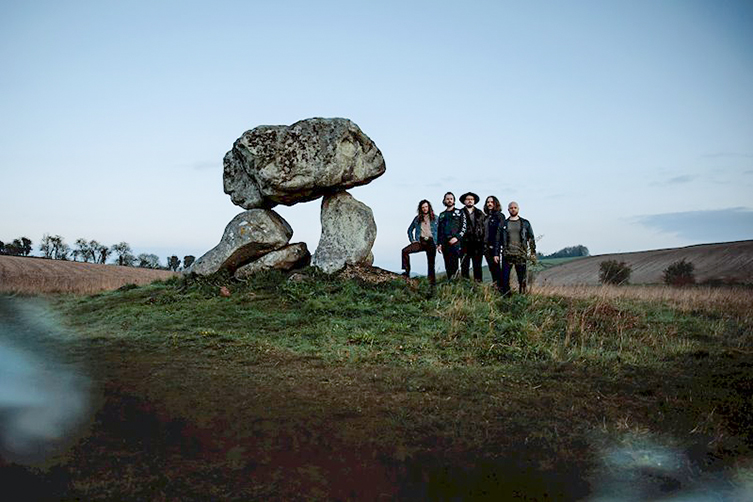
Guitarguitar: Occult references and imagery form a large part of your band’s aesthetic. Do any members of the band follow any occult/wiccan/earth magic practices or tradition in their daily lives?
Tom Templar: My approach to occultism doesn't follow any one tradition - I'm more of the Alan Moore school of using the occult and occulture as a general creative philosophy and practice. I find the occult crucial in my approach to making art, in harnessing my imagination, and also - obviously! - as lyrical subject matter. I see folklore in a similar way - sometimes I think the only difference between the terms 'the occult' and 'folklore' is their class background... it's all lore.
GG: Witchcraft and the occult has been central to rock n roll since the beginning (from Robert Johnson to Dr John to Jimmy Page). Why do you think that is?
TT: I think rock & roll emerged out of an artistic counterculture that had been dabbling in occult thought for a long time, from classical music to modern art. I just finished reading a brilliant book by Phil Baker, City of the Beast, a kind of biography of Aleister Crowley through places he inhabited in London, and what struck me most was that the bohemian Edwardians were so similar to pop culture revolutionaries of the 60s - they embraced free love, Eastern religion, psychedelic drugs, and all sorts of occult practices in a way that is pretty much indistinguishable from what came later (except the clothes were a bit starchier, and they were probably listening to Stravinsky rather than The Doors). It's more that rock & roll came from the occult, rather than the occult was referenced by rock & roll...!
"I think live music is one of the few truly communal and ritualistic experiences that survives in modern Western culture, especially with the decline of religion. I know I've gone into gigs and come out a different person, and that those experiences have helped me to grow, find my people and understand the world, and what's more occult than that?!"
GG: Were there particular musical bands/influences that inspired Green Lung to include these themes in your music?
TT: Absolutely - it's pretty well-documented at this point that I grew up on a steady diet of doom, psych and occult rock bands, lots of them coming out of the Rise Above Records golden years of the early aughts. Electric Wizard, Witchcraft, Blood Ceremony, Cathedral, Pentagram - they all made an impression in my teens.
Scott, our guitarist and primary songwriter is heavily influenced by the music of the early 70s, from early Queen to Deep Purple to Uriah Heep, and while those bands might not have been explicitly occult rock, they were definitely influenced by occult thinking, even if they might not have been fully cognisant of it. Queen's early albums are very magickal to my ear!
GG: The Beatles had Aleister Crowley on the cover of Sgt Pepper’s, and Led Zeppelin had their four symbols. These seem almost like hidden esoteric messages. Do Green Lung use similar hidden messages or ideas within artwork or lyrical themes?
TT: Definitely - I like to weave in as much intertextual detail as I can into both the lyrics and the art. But I don't necessarily want to give the game away, and I'd rather those interested do their own research! But as an example, we wear sigils onstage which were designed by Richard Wells, our graphic designer, and they all contain meaningful symbolism that is personal to each member of the band.
The longer we do Green Lung, the more in-jokes and references become a part of it - I love the back cover of Iron Maiden's Somewhere in Time, which features dozens of little references for those in the know - and I think if you can pull that kind of thing off, it's a surefire sign that you're building a real body of work that has its own internal logic and that resonates with people. Lots of it is world building, really, and you can't have a world without symbols.
GG: British folklore includes lots of ritual and superstition as well. What do you think today’s audiences can benefit from looking into folkloric traditions?
TT: As I gestured at in my response to the first question, I see folklore as a kind of toolkit for artists, musicians, activists - any creative people. Almost everything about British folklore is contested and half-remembered, and it's sort of a microcosm of how human culture as a whole is constantly evolving and changing in meaning, never staying fixed. There's no hierarchy, no real organisation, but it's something that brings joy and meaning to a lot of ordinary people.
Life in the West under late capitalism has been hollowed out of meaning in so many ways - our governments seem to want to make Aldous Huxley's Brave New World a reality. So I think people benefit hugely by participating in traditions and ways of thinking that are divorced from capital, from humanist thinking, and bring them closer to the land and nature. And I think in modern life we are starved of spirituality and desiccated by rationality, and the occult and folklore offer a respite.
GG:The esoteric influences on Green Lung seem to be particularly British, is that correct? How do these traditions speak to the band?
TT: Yes I see the remit of Green Lung as essentially British, because I like to write about what I know. I would feel a bit fraudulent trying to invoke the spirit of Slavic folklore, or to be playing around with the stories of American occultists (though I'm fascinated by the story of Jack Parsons, the rocket scientist who was a devoted Thelemite!) As I've said, I see folklore as a toolkit, but I also think you've got to be respectful of it, and understand its contours before you try to put your own spin on it - otherwise you're just someone like JK Rowling throwing around occult terminology willy-nilly and eroding it of any of its power and meaning.
And we're lucky in Britain to have a rich history of occultism - from John Dee to the Ordo Templi Orientis, a lot of the key thinkers have lived here (even though, like Madame Blavatsky, a lot of them came from further afield!)
GG: Do you feel that rock gigs are ritualistic? Or, a communal focus of energy perhaps?
TT: Of course! I think live music is one of the few truly communal and ritualistic experiences that survives in modern Western culture, especially with the decline of religion. I know I've gone into gigs and come out a different person, and that those experiences have helped me to grow, find my people and understand the world, and what's more occult than that?! Heavy metal isn't far off being a very large secret society.
Ultimately, no matter how much capitalism tries to make music into a game of monthly listeners and merchandise sales, one thing that can never be contained or truly commodified is the power and energy of hundreds of people coming together to lose their earthly selves and enter into a different realm for a few hours. That's magick to me."
Well said, Tom!
The Satanic Panic
Back in the 80s, lots of rock bands started getting a bad rap. Specifically, lots of American families (it mostly happened in the States, though pockets of mania arose elsewhere too such as in the UK and the Netherlands) started paying attention to what hyperventilating TV evangelists were saying about ‘the devil’s music’, amongst other things. Stories about terrible abuses began to circulate throughout culture, and these abuses were being squarely blamed at Satan. Somehow, this translated also to metal bands…
The Satanic Panic had arrived to morally outrage good honest people everywhere. Reports of SRA (Satanic Ritual Abuse) abounded in their thousands, though it seems that all were disproved; allegations about cult-based abuse from satan worshippers arose too, also despite a lack of actual evidence.
One children’s report (I should clarify that this is a specific, actual allegation…) was that children were being flushed down toilets to secret rooms where they were being abused, then cleaned up and sent back out into the world.
Read that part again. This makes reports of people literally seeing witches flying across the sky (another actual allegation) seem almost mundane.
So, what was making everyone lose it in such a grandiose and extraordinary way?
Well, I’m really not sure, apart from the hysteria that mounts when people continually require themselves to be outraged at something. It seems like nobody has effectively explained the satanic panic, or particularly defined it for the matter. The lack of credible evidence for any of the allegations hasn't helped, but why did people start reporting this stuff in the first place? Before the hysterics elevated it all?
Was it rock music?
For example, Judas Priest were infamously hauled in front of a judge in the USA and accused of recording backwards/reversed audio messages of satanic intent (only audible when listened to in reverse, naturally) that had led to a double teen suicide. A terrible tragedy without doubt, but the fact remains that there were never any subliminal or backwards messages included in any of Judas Priest’s music. The connection to Satan here is tenuous.
The band were found to be ‘not liable’ in the deaths of the boys some 25 years after their initial hearing. Was this simply America’s war on rock music during the 1980s? I don’t know. It seems preposterous to try to understand it today, when anybody can buy all of Aleister Crowley’s writings for their kindle - with no preemptive warning about moral corruption, I should add - for a couple of quid.
The satanic panic is conspicuous today by its absence. Did Satan just go away?
Occultism and Music
Those are just a few examples of characters, moments and scenes that have seen the worlds of the occult and esoteric mixing with those of music.
What have I learned?
- The shadow of Aleister Crowley looms large, and seems to represent something of a subversive pioneering of the concept of ‘following one’s will’.
- The forms of music seem to be at least somewhat synonymous with ritualistic practice. At any rate, musicians seem able to understand ritual processes, in whatever context.
- When people don’t know facts, they can invent outrageous stories to fill the void.
- When facts are available, they are often outrageous anyway.
- Different cultures, faiths and religions all have their esoteric and occult stories that tie in with music.
- Magickal practises can be a unifying force for social circles who feel ostracised from the mainstream.
Besides these somewhat diverse examples today, there are so many more that I could’ve added, but you’ve already stuck with me for quite a while! I also recognise that I’ve asked a lot of questions without necessarily offering up answers, but then you knew that was how it was always going to be, didn’t you?
Revelling in the mystery of it all is a big part of the attraction, along with the possibility that these supernatural activities may just have some kernel of objective truth about them. I suppose it depends on your own perspectives and experiences, but I’ll say that enough people have spent enough time on these subjects - and on these people - to make them warrant deeper inspection.
I hope you’ve enjoyed this brief swim through less-charted waters with me today. As a rock fan and a guitar fan, all of this stuff is related to what you love, and it’s good to have some knowledge of it. What do you think? Was Aleister Crowley onto something besides his own public image? Did Jimmy Page invoke dark forces to enhance his career? Does the devil really get all the best tunes?
You tell me.


